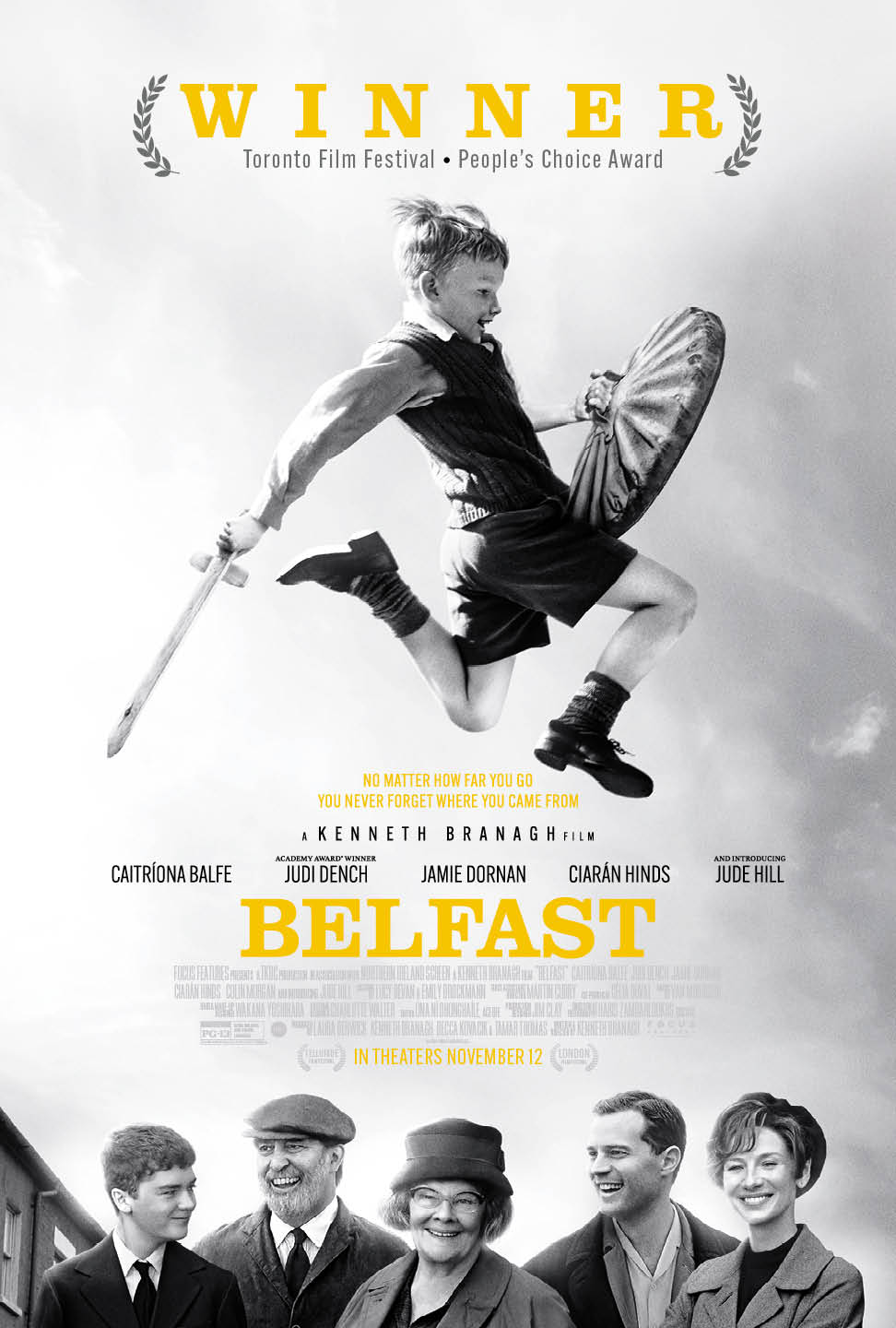
30 Nov Belfast Review
BELFAST
dir. Kenneth Branagh, starring Jude Hill, Caitríona Balfe, and Jamie Dornan
Mostly known for his passion for the works of William Shakespeare (odd, considering he hasn’t directed a Shakespeare story in two decades), writer/director Kenneth Branagh returned to his roots after having previously helmed the critically disastrous Artemis Fowl for Disney+. In doing so, he found inspiration within his own life to write Belfast, the coming-of-age dramedy, loosely basing elements off his days as a wee lad in the city. Set during what’s known as The Troubles, an ethno-nationalist conflict centered around Northern Ireland and their relationship to the United Kingdom, Belfast focuses on young Buddy, a kid whose main preoccupation is learning his maths and daydreaming of Catherine, another student in his class. Financial woes keep Buddy’s parents in constant turmoil with each other, and his father’s long absences due to working in London are felt as Buddy spends most of his time with his grandparents. Buddy’s life is upended as Ma and Pa announce they’re thinking of leaving Belfast and the political tension constantly bubbling under the surface finally boils to a head.
At its core, Belfast is a story of the willingness to accept and embrace change in the midst of stormy times. Every character has their resolve and their worldview tested in the film, and how each character decides to deal with these tests help shape who they are and endear them to the audience. While the antagonists of the film are rarely seen (outside of their initial explosion into the story, Colin Morgan’s Billy Clanton, the face of the group trying to bully the population into their way of thinking, has maybe four scenes), their presence and the presence of possible violence looms throughout the film, coloring decisions made and decisions not made. Branagh’s effectiveness at weaving this undercurrent of dread throughout the Buddy’s otherwise happy life is masterfully done and serves to create another layer of tension on top of brewing tension between Buddy’s parents.
Starring Jude Hill as Buddy, Belfast’s strongest quality is in its actors and their relationship with each other. As Buddy, Hill is immediately likeable with a wide open face, fantastic smile, and comedic timing that ensures that he’ll grow into being one of Ireland’s finest actors. Hill also handles the emotional scenes as well, playing off all the adults and managing to still captivate and hold his own. Caitríona Balfe, Buddy’s Ma, is the very figure of Tired Single Parent; Ma’s frustration with their financial situation, as well as the mounting danger of the safety of Belfast due to The Troubles (and a dash of Buddy’s shenanigans) all work to create a character that’s short on patience but vast in love for her family. Aside from Hill, Balfe’s performance is the best in the film as Ma struggles to hold her family together.
Jamie Dornan as Pa, Buddy’s father, also turns in a solid role. While in and out of the movie due to Pa working out of the country, Dornan’s quiet strength and conflict with Ma over the safety of their family is highlighted in his subtle performance. A man who radiates a good natured warm with determined steel underneath, Dornan shines in the little screen time he’s given. Dame Judi Dench and Ciarán Hinds as Pa’s parents, Buddy’s grandparents who help to look after him, are some of the best supporting characters in 2021. The chemistry of the two actors is off the charts as they humor and fuss over each other, with Branagh’s writing giving them the feel of a couple who’ve shared a long, solid history together. Both Dench and Hinds are stellar in their portrayals of the voices of reason and advice for Ma and Pa, and Hinds’ relationship with Hill is easily the best bond of the movie.
Branagh’s writing and direction (possibly aided by his closeness with the material) is especially sharp in Belfast. A joyous blend of heart, humor, and somberness, Buddy’s journey of shedding his first level of innocence and naivete is lovingly handled by Branagh. At only 97 minutes, the film moves incredibly quick without ever feeling rushed or skipping over key moments; every scene serves a purpose to either flesh out a character or a motivation. Branagh’s technical work is key as well; beautiful cinematography as well as including key monuments that are beloved by the locals shows that the veteran director is able to make a movie specifically for his people but still manage to resonate with a universal appeal.
Overall, Belfast shines as one of the most emotional, passionate, and soulful films Branagh has directed to date. A complete through-and-through love letter to the city that bore him, it drips with the wistfulness of a man on in years looking back fondly on his past. Quickly paced, Branagh tells a lot of story in a small amount of time and the audience will be swept along for the journey within minutes. Immaculately crafted, well acted, and with cinematography to help embellish the beauty of the land, Belfast is one of the best movies of the year. Belfast is currently in theaters.
Review by Darryl Mansel


No Comments